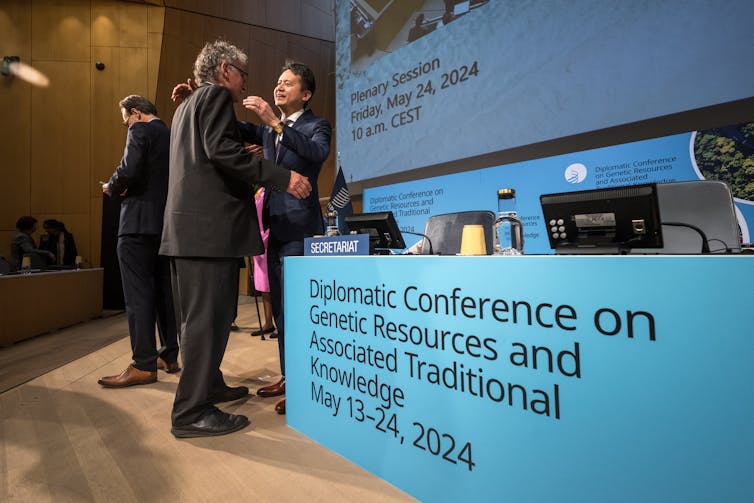The problem of “biopiracy” – the misappropriation and patenting for profit of Indigenous knowledge – has been on the rise for some time. So a global treaty aimed at protecting traditional knowledge and genetic resources should be a welcome development.
In late May, the World Intellectual Property Organization (WIPO) adopted the Treaty on Intellectual Property, Genetic Resources and Traditional Knowledge. It is the first international agreement on intellectual property that includes provisions on Indigenous peoples’ knowledge.
More than 20 years in the making, it represents the culmination of negotiations between the 193 WIPO member states since 2000. And on the face of it, the treaty appears to be an important intervention to prevent biopiracy.
However, the new agreement is unlikely to lead to major changes to New Zealand law, or improve the rights of Māori to own or control their intellectual property and taonga (treasured possessions). Given the well-documented misappropriation of Māori knowledge and taonga, more substantive protections are still needed.
Disclosure of origin
Several studies have found instances of non-Māori businesses seeking patents and plant variety rights for the use of native plants similar to known Māori practices.
In these cases, several of which relate to mānuka, there is no evidence Māori were consulted or gave permission for their mātauranga (traditional knowledge) to be used.
The WIPO treaty introduces a “disclosure of origin” requirement. Where patent claims cover genetic resources, applicants must disclose the country of origin or source of those resources.
Furthermore, where the claimed invention is based on traditional knowledge, applicants must disclose which Indigenous peoples, local communities or other sources provided the knowledge.
While this has been heralded as a “historic” step forward, the Intellectual Property Office of New Zealand (IPONZ) already requires patent applicants to indicate whether their application involves traditional knowledge, or might conflict with Māori interests.
Not that new for NZ
IPONZ can then decide to send the application to the Patents Māori Advisory Committee, which advises on whether an invention is derived from Māori traditional knowledge or from indigenous plants or animals.
If it is, the committee also advises on whether the commercial exploitation of that invention might be contrary to Māori values. IPONZ then uses this advice to decide if an application should be rejected on the basis of “morality or public order”.
In other words, the disclosure-of-origin requirement is not such a historic step as some might imagine, at least for Aotearoa New Zealand. That said, the WIPO treaty will require appropriate measures to be implemented in domestic law to address any failure to provide the information.
The possible sanctions or remedies are limited, however. The treaty states that, unless there is fraudulent behaviour, a granted patent cannot be revoked, invalidated or rendered unenforceable due to a failure to disclose.
Still, this is better than the current situation, where there are no sanctions or remedies for failure to disclose.

Earlier drafts went further
Arguably, the new treaty is notable more for what it does not do. In fact, earlier drafts of the treaty articles, released in 2023, went further than the eventual text does.
These included a framework under which traditional knowledge itself could be protected as the intellectual property of Indigenous peoples and local communities. This would have provided them with exclusive collective rights to control their traditional knowledge.
The draft articles also proposed Indigenous peoples and local communities would have the right to receive a fair and equitable share of benefits from the use of their traditional knowledge. They would also have the right of attribution, and the right to use their traditional knowledge in a manner that respects its integrity.
The final treaty does not include this form of positive protection for Indigenous knowledge. It also fails to protect “traditional cultural expressions” – the forms in which Indigenous peoples or local communities express their traditional cultural practices and knowledge, including music, dance, art and handicrafts.
Patent system sanctity
Compared with those earlier drafts, the concluded treaty is significantly narrower and less substantive.
It might help prevent the misappropriation of traditional knowledge in the patent system. But the treaty does not offer a positive form of protection for traditional knowledge itself, or traditional cultural expressions.
In fact, one could argue the treaty is more about ensuring the sanctity of the patent system, than it is about protecting Indigenous knowledge. After all, patent law requires inventions to be new and inventive compared to existing knowledge.
A requirement that applicants disclose the origin of genetic resources, and the knowledge relating to those resources, only improves the patent system.
Implementing the WIPO treaty in Aotearoa New Zealand will protect the patent system from granting bad patents. But it will not protect mātauranga Māori, or ensure Māori retain tino rangatiratanga (sovereignty) over their taonga, as guaranteed by te Tiriti o Waitangi (Treaty of Waitangi).

